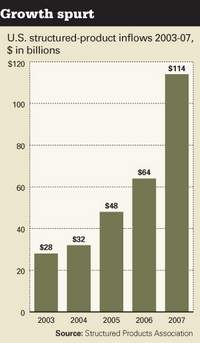by Lori Pizzani, US news reporter
StructuredRetailProducts.com
WASHINGTON D.C. (March 5, 2008) -- The US Structured Products Association (SPA) today asked US lawmakers to take a slow and even-handed approach when considering tax changes to all financial instruments and investments as they consider a bill seeking to impose higher taxes on derivative products.
Giving testimony earlier today to the House of Representatives Ways and Means Subcommittee on Financial Derivatives Taxation, the industry body asked whether adding potentially burdensome taxes on those investing in structured products would deepen the competitive financial market chasm that has developed between the US and other nations globally.
The testimony, given by Keith Styrcula, chairman and founder of the SPA, implored Congress to be thoughtful when considering tax changes to an array of financial products. "We agree wholeheartedly with the Subcommittee that new legislation on the taxation of retail financial instruments is in order. Such legislation, however, should analyse all investment vehicles at the ground-level -- inclusive of ETFs, closed-end funds, mutual funds, convertible bonds, managed accounts, insurance products, unit investment trusts and single-stock positions -- to arrive at a fair and consistent approach to taxation of financial instruments," said Styrcula.
"Any attempt to single out financial derivatives, prepaid forwards, and structured products in the absence of a full consideration of all other financial instruments is a potentially dangerous precedent that could have vast and unforeseen consequences in the global arena."
Styrcula highlighted the growing local structured products industry, which grew from $64bn in 2006 to $114bn by the end of 2007, and asked the committee to consider any unintended consequences of a sudden change in tax laws, including widening the current competitive gap between the US capital markets and its global rivals.
He also said that capital-guaranteed investments had the potential to follow the European model and become, "the dominant investment vehicle for prudent American investors, if it weren't for a significant drawback -- an exceptionally disadvantageous tax treatment."
If, however, the tax treatment of capital-guaranteed products were simple and reasonable to the investor, the US financial services industry would be able to promote them on a larger scale while generating substantial revenue for the Treasury, he predicted, citing analysis from SRP.
Following pressure from the Investment Company Institute, the US trade organisation representing the $11tr mutual fund and exchange-traded fund industry, Representative Richard Neal introduced a bill (H.R. 4912) to the House of Representatives on 19 December 2007 seeking to impose more stringent taxes on derivative instruments, including prepaid forward contracts (such as exchange traded notes).
Click here <http://www.structuredretailproducts.com/uploads/news/SPA_tax_testimony.pdf> for the full written testimony of the US SPA.
Subscribe to:
Post Comments (Atom)




No comments:
Post a Comment